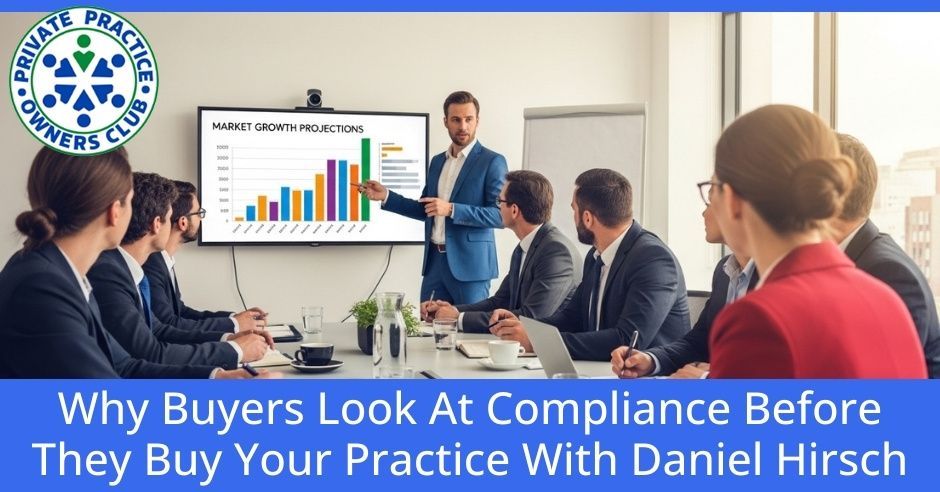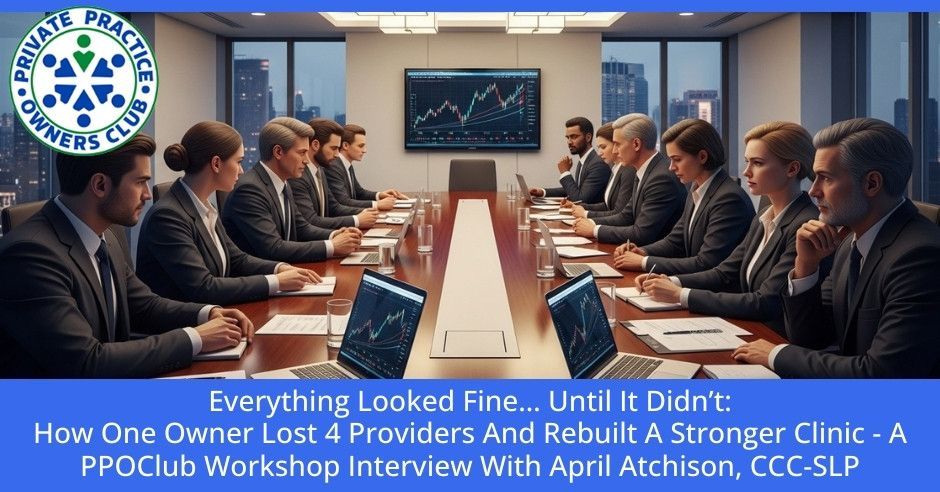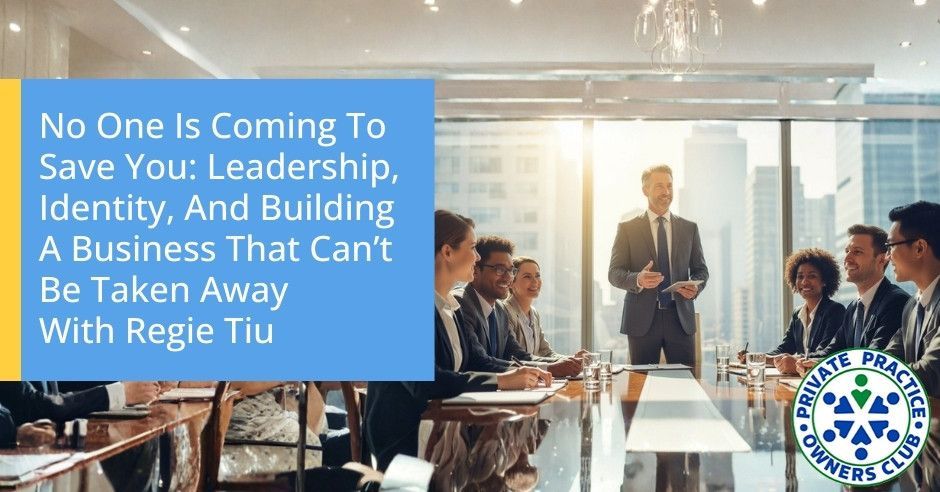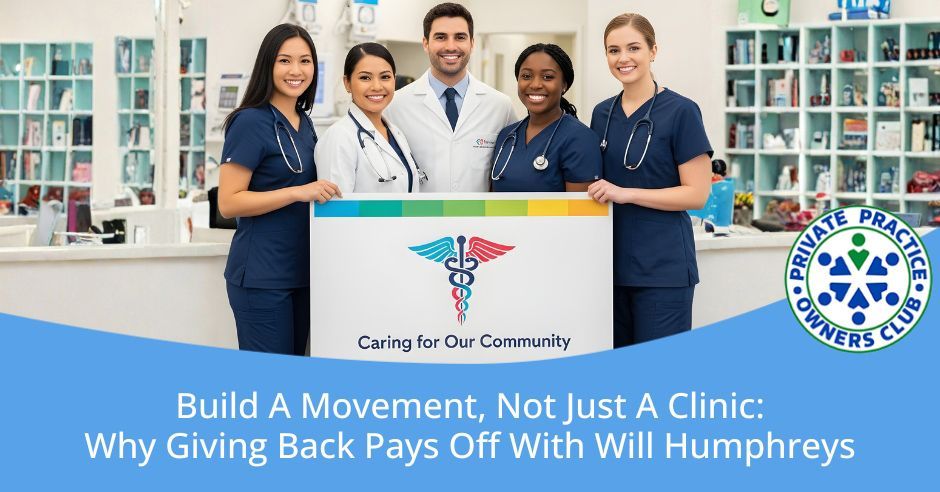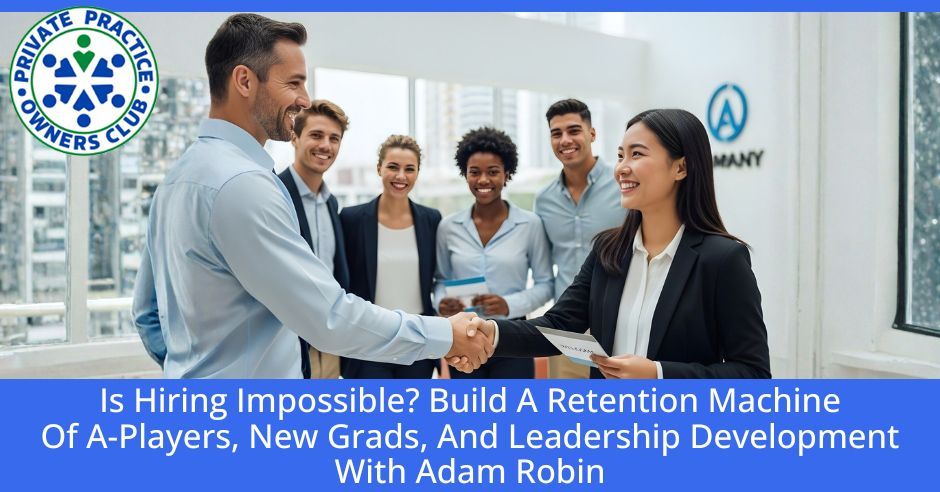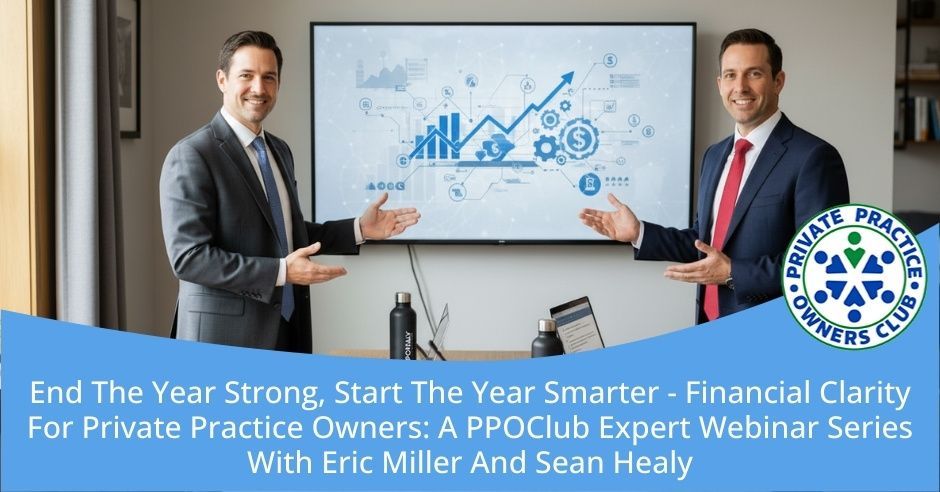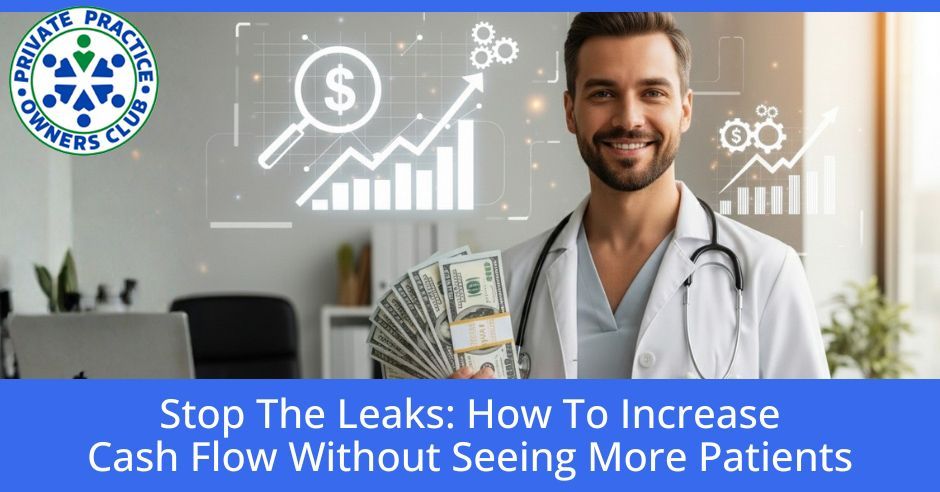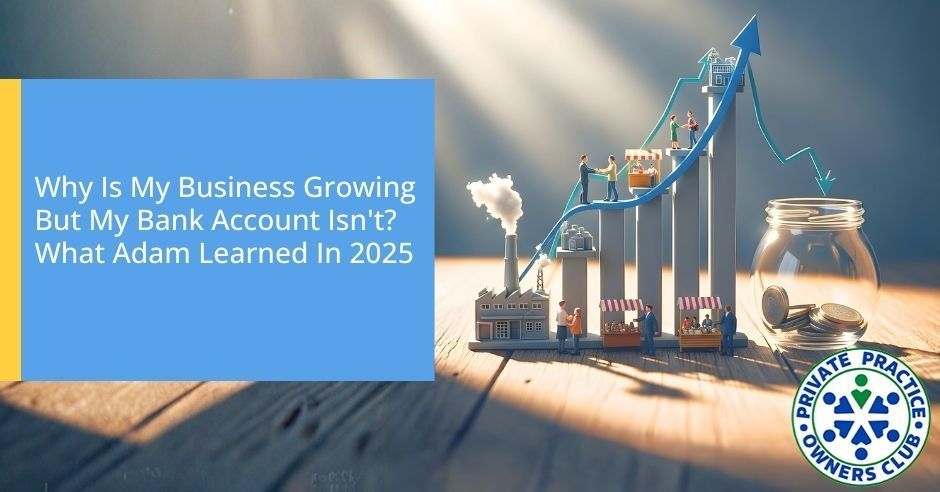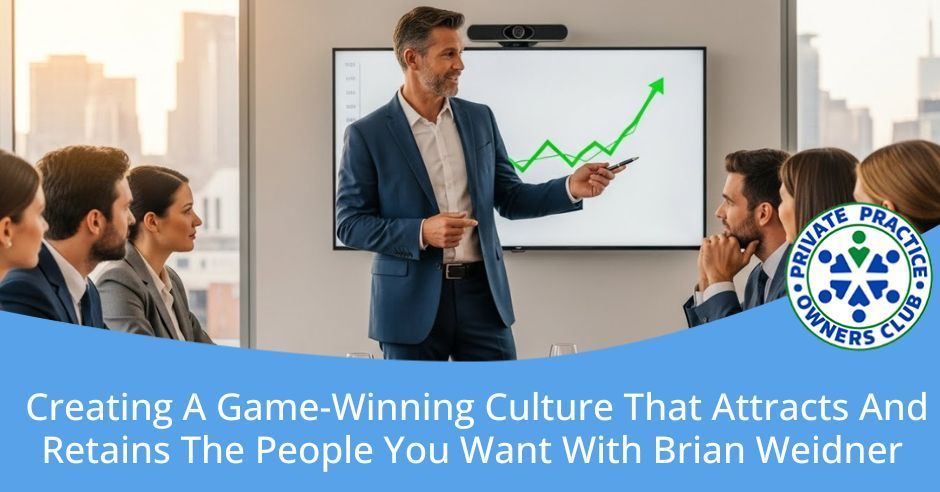5 Things To Stand Out From The Rest In Your Community
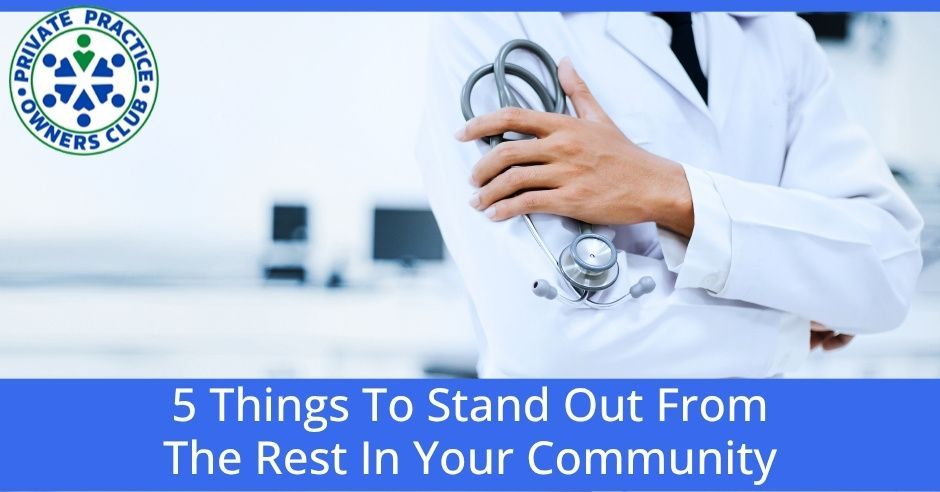
Have you ever considered what it would take for you to stand out in your community, what you would have to do differently to grow your practice and make a bigger impact? In this episode, Nathan Shields and Adam Robin discuss the 5 things you must do if you want to generate the impact that you're seeking. You may be surprised to find that it doesn't require a significant amount a month, doesn't require any new equipment, and simply relies on improving your product and leveraging what you already have.
These processes aren't new, but just well laid-out for Private Practice Owners to implement easily and quickly. And if you like the podcast and you're looking for more support in transforming your business, reach out to Adam at adam@ppoclub.com or book a call via our website:www.ppoclub.com.
---
Listen to the Podcast here
5 Things To Stand Out From The Rest In Your Community
Welcome to the show. I've got Adam Robin with me. How are you doing?
Fired up, man. Podcast on a Friday. Always fired up a little bit. Turned up a little bit on a Friday. Wait, everything's kicked up just a little bit more.
I always get excited going into the show’s episodes anyway. Friday doesn't make a difference, but it is nice to know the weekend's coming up.
For sure, man.
You've got another topic that you have not let me in on. This is unbeknownst to me. Before we get into the topic, got to announce. Conference coming up in October 2 through 4, 2025. Go to PPOClubEvents.com/homepage. That's the registration page. You'll club PPOClubEvents.com/homepage or go to the PPOClub.com website. There's a resources section. You'll see the events in there, and you can go through those links to find it as well.
Make sure you get signed up, and we've got early bird discounts that are going on. Part of August, probably not all the way through August, but look into that, bring your team members. We've got some awesome speakers talking about growing our practices. What it takes to get to where we want to go. If that's something that you're into, that you're looking to grow your practice, you're looking to transform your clinic.
You're at a sticking point where you don't know what to do with your business to move it to the next level. You're just not living the dream that you're hoping to live. When you open up your clinic, make sure you go in, register, and come to Destin, Florida, with us. Join us on the beach, October 2 to 4. That being said, let's move forward. What is the topic of the day?
Becoming The Go-To Provider In Town
The topic of the day is how to be the go-to provider in town. Where did this topic come from?
The first question.
The topic came from David Strait with E-Rehab. Me and him chat back and forth, and we're always talking marketing. I love David because he always simplifies marketing. It's like marketing is not that complicated. Stop making it so complicated. Just do the work, have a message, and deliver great care. One of the things that David and I really talk about is that everybody wants to talk about SEO, Search Engine Optimization. It's like SEO is going to solve all my problems. Not really. I think that there is some relevance there.
What David likes to do, and I'm highlighting David, is that he just prioritizes SEO in the local community because people outside of the twenty-mile radius of your clinic they're not coming to you. They're going to the clinic next door. If you want to make an influence on your people, if you want to grow your practice, and you want to build a reputation, you have to focus on that twenty-mile radius around your clinic. You've got to be the hometown hero. The hometown hero or the go-to provider.
I know, like in your area, twenty miles doesn't encompass a lot of PT clinics. I was thinking of Arizona. If you gave me a twenty-mile radius in the Phoenix metropolitan area, there are hundreds of clinics in that area.
Maybe it's 5, maybe it's 10, whatever that is.
Maybe it's two. Talking to people in Long Island or downtown Manhattan or something like that. Maybe it's half a mile, but you get the point. Let's get this focal point on just the immediate radius around our clinics to focus on those people.
I'm not like running data here, guys. I'm just going off of what feels right. As for me, I'm spending 80% of my energy there. What is the 80/20 rule? It's been 80, right? It's like, I'm going to spend most of my energy right there. I want to know who lives there, who owns a business in that area, and who are the key influencers in that area. If I can start positioning myself as an authority in that really tight circle, then you're probably going to start getting some referrals in your practice. That's what we're to talk about.
The Power Of Reputation In Your Community
I can see that. Becoming the master of that space in your community, totally right. You're the go-to person. How do we do that? Do you want to get right into it?
Let's do it. The key here is you're never going to build a practice without a solid local reputation. Not going to do it. My friend Spencer will be at the conference speaking, a really powerful owner. He tells the story about if I'm a practice owner and there's this person with a total knee replacement, and they come to see me, and the goal is to get them to 120 degrees of knee flexion.
You're never going to build a practice without a solid reputation.
Maybe I only get them to 115 degrees of knee flexion, but my reputation is amazing. I provide a world-class experience for them. They feel heard, they feel understood, they feel part of the process. Their expectations are managed, and they feel like their perception is that they cannot lose with me versus Nathan. You've got a terrible reputation, but maybe you can get them 120 degrees because you've got all the certifications in your name, behind your name. You're a better therapist than me.
The experience isn't that great.
Experiences, it's dry, it's not great, you don't connect with the patients, you don't have your systems dialed in yet. Who do you think that person's coming to see next time?
They'll go with the experience, right?
Totally.
They'll go with people that they like, and they'll go with the better experience. What do they know about the difference between five degrees of knee flexion?
They don't. It's not the objective value that's important. It's the perceived value that's important.

I like that.
#1 Operational Excellence: Your Clinic's Foundation
Here's the first step. You ready? Operational excellence, specifically systems that are installed into your practice that prioritize a world-class patient experience. Where expectations are met, communication is clear, and patients are challenged appropriately to take full ownership of their outcomes. If you can build that patient lifecycle inside your practice, that's the first foundation of ensuring that you're generating internal referrals, you're calling your past patients. That patients are staying and referring their friends and family members to you.
I think you might've touched on this with your podcast episode with Jerry Durham. I believe I did a number of years ago with him as well where we talking about the patient experience and not only mapping that out, but that's the first place I went to when you talked about, when you explained operational excellence, and that is like recognizing the touch points, the opportunities that we have to make an influence on a patient physically or over the phone or virtually whatever it might be. You can count them out.
You can map them out on paper or wherever and take one at a time. Over time, you can look at it with a few different lenses. You shared a few questions that you could ask the team. Like, “How can we improve this one experience?” Let's take, for example, the first phone call. How can we take that first experience? We have a group of people looking at that experience. How can we make that world-class? How can we make that a five-star experience so that when they get off the phone, the person is thinking, “I want to go there, they have their crap together.”
They've thought about it. They've thought about that phone.
They're very professional here. There's something different. What do we have to do, say, to make them feel, and get the perceived value? I love that you use that perceived value from the one call that makes it a world-class experience. I think that's a common question. I remember listening to another podcast where they said, “Imagine you are like an Airbnb. You rate your Airbnb with five stars. What would you have to do?”
Just to challenge your team, maybe your leadership team, or the other providers and team members, front desk, whatnot. What will we have to do to make that touch point a 6 or 7-star experience? If you're talking about an Airbnb, that's like we're going to like have the Uber ready for them at the airport with snacks in the backseat. They're the snacks that they like in the backseat, ready for them that drives them to the Airbnb.
We're to spray the headrest with a little bit of cologne or something to make it smell good.
What could we do to go over the top, and just, that's just a good experience to be like, what are the ultimate possibilities? Let's not hold ourselves back for that with any particular guidelines per se. Let's take that framework, that mindset, into each touch point, so that let's now look at the first time they walk into the clinic. What does that five-star experience look like? Go one by one. It can be overwhelming if you're trying to do this in a single setting, but maybe you just take one day and take it back, and talk about one of those patient touch points, and make it world-class. How do we have to take it to the next level? How do we have to systematize this to produce five-star experiences for everyone?
I own three companies now.
You own more than three companies. Maybe so, you own three clinics. You have more companies.
Every single time I've launched a company, it's started with the experience, every single time. I'm not going to feel comfortable selling something until I know that those customers or those patients are going to be blown away. How can I go to the public and be like, “I'm the best, I feel great about what we do.”
How can I speak boldly and confidently about my thing unless I've already spent so much energy and like perfected the value? I cannot, but if you can get that right, you can shout to the rooftops like, “We're proud of what we built here.” It's the ultimate gift. Once you start getting those testimonials in, like that really is, you become the facilitator of your word of mouth experience of your word of mouth referrals because you've paid attention to it. For those of you who listen to this show, you are the weird ones. No one else is doing this.
That's true.
The Mom and Pop Shop that's down the corner, the hospital systems, they're not doing this. They're not thinking about this. If you just spend a couple months like really dialing in your operation so that you can manage the expectations of your people, then what I like to think about is I want to know already what my patients' concerns are going to be because I've studied them so much, whether that's co-payments or scheduling, like all the concerns.
I'm going to have answers to that before they even ask the question. Those expectations are going to be so met, like I'm going to meet them where they're at, and I'm going to be so out in front of their concerns that they feel like they cannot lose here. They just feel like they cannot lose. It makes saying yes very easy, and it makes getting them what they want very easy as well because they're bought into the thing.
People buy into it a lot more when they have a feeling of being understood.
It's like, “How were you in my head? You already understand me.” “I was just asked. I was just going to ask that. Thank you for sharing that information.” It's like you're already in front of this already thought about this stuff. Right. That's where you need to start. I'd say operational excellence. I think that's going to be the thing that will give you the confidence to start asking people for money.
Which is when you have a real business. I think there's a way to do that step by step. As I talked about, if you just like to get the map out, map out the experience. As I said, it's not a ton of touchpoints, but go one by one. Maybe it takes you a year to go through all of it because you're going to focus on one of those touchpoints and everything you can do around it. Figuring it out might take a month or two.
You just move forward onto the next one. Once you feel you've got that dialed in and then you come back and revisit it every so often. Especially when there's an upset, when things don't go right, those different touch points, an opportunity to review it. Like, “Did we fall short on our values? What procedure did we not follow that was working in the past? What can we learn and how can we improve our system?”
Here's the way to do it. Build it on paper as best as you can, and enroll your team in doing it. Every time there's a positive experience from a patient, ask them, “Why was it positive? What did you like most about it? Where did we really shine?” Every time there's a negative experience, it's like, “What could we have done better? What would have made this better? What can we learn from this?” You're continuously taking that feedback and putting it back into the system to improve it until you've got this perfect process.
I like it.
That's it. You're ready for number two?
Yeah, let's go.
#2 Strategically Capturing Testimonials And Referrals
You've got some energy going into your operations. The second thing is going to be strategically capturing testimonials and internal referrals inside your practice. How to become the hometown here? How to become the go-to provider? The first thing that people are going to do is they're going to ask their network. They're going to call their cousin or their uncle or their brother or their sister or they're going to Facebook. They're going to say, “I'm looking for a physical therapist or an occupational therapist. I'm looking for a therapist. Where should I go?”
They're going to solicit the opinions of the people that they trust. The number one way to make sure that you're looked at in a positive light by the people is to ask them for positive feedback. You invite them to talk positively about your stuff. You literally become the facilitator of your positive reputation by asking your people to give you positive feedback. It's capturing testimonials and referrals inside that life cycle. I felt like it was appropriate to distinctly like separate those, but I think that is a massively powerful way for you to build a positive reputation in the community.
This is a powerful action to take because I consider a podcast that number, I did a few years ago with Mike Bills. I want to say they spend an hour a week, all their team members talking about how they can elicit referrals and testimonials from their patients, like they set aside that much time, which is like beyond me like mind blowing that they would set aside an hour of production time per week, everybody to sit across from one another.
They pair off in twos, and they talk about, “Let's talk about how to get a referral today. How to talk to a patient? How to help them overcome objections?” That stuff. The reason it was so powerful is because when it got to the point, remember during COVID, where physicians weren't necessarily referring anymore?
He's like, it barely affected us because we get like 80% or 90% of our patients from referrals, from other patient referrals, or reactivating our old patients. We get like 10% or 11% of our patients from physician referral. Crazy. That's super powerful. You don't have to do that. If you want to do that, great, but that just shows the power of what can be by really focusing on exactly what we're talking about, becoming the expert in the community, and really pushing the word of mouth marketing.
You're never going to get what you don't ask for. This is a barrier for a lot of owners. I'm speaking to my younger self, like asking for referrals. It can seem like our brain or the world wants to tell us that it's like sleazy or that it's like they feel awkward doing it. It's a little bit of a mindset that you have to get over. The reason why I wanted to bring that up is if you're listening to this and you have a team, that's exactly what they're thinking, too. Building the mindset in the practice that's like, “We're excited about what we've built, our amazing experience.”
You are never going to get what you don't ask for.
We've done a lot of work and like, “Damn it, we're pretty good at it.” We're going to try to find as many people in the community that we can help. I'm going to give you guys a little bit of a framework that you could potentially use to help T this up for you. T this up with your team. The first thing is during the initial evaluation, this is the time when you start preparing your patients for the ask.
You set the expectation on the first visit, and it looks like this. “Nathan, welcome to Southern Physical Therapy Clinic. By the way, around the 4 to 6 week mark, I'm going to sit down with you and I'm going to ask you about your experience. If our experience is great, I'm even going to ask you to leave us a testimonial or maybe refer a friend or family member. I wanna provide you with so much value that you'd be willing to do that.
Is that okay if I do that?” “Yes.” “Great.” Now, first of all, you're on the hook for providing exceptional service. The second thing is, they're expecting the ask. They're expecting the ask, so set the expectation on the initial eval. The second thing is to plan it. What we like to do is like on the sixth visit, we have a process where we just have our patients fill out a form, a short little one-page form. It's like 0 to 10. How are you doing? How's the schedule? The last question is, “Who do you know in your network.
Who you'd be willing to refer to us?” Our providers they go into the waiting room, and they're like, “Nathan, come on back. Go ahead and bring that paper with you.” They sit down and they say, “Let's review this paper.” Nathan, you said this, “I see that you might have somebody in your network. Who comes to mind?” We're planning that process. It's baked into the process. It's not all willy-nilly, just as things happen. Does that make sense?
Yeah. That's awesome. When we were really doing things well, we had a patient success manager who would, this was her process. One of her things was to call every patient across the four clinics on the 3rd or 4th. After the 3rd or 4th visit, something like that, and ask these same questions. Perfect. You can do it many different ways, but systematizing it is what we're talking about. It's not leaving it up to the memory of a provider or a front desk person to remember, to ask them verbally. No. Here's the sheet, and they know that it's supposed to go out with every 3rd or 4th, or 6th visit, whatever you decide. It's just part of the process now.
I would recommend that like as you're approaching discharge, have a process to capture that positive testimonial. It's like, “How was your experience?” Like ask, ”How was your experience, Nathan?” “It was amazing. Very happy.” “Would you be willing to share that?” They would mean the world. When we capture that and we put it on Google, we put it on Facebook, or we put it on our website. That way, whenever people think about Southern Physical Therapy Clinic, they're thinking about that review that Nathan left. That's going to be the second way, capturing testimonials and reviews. Ready for number three?
Yes.
#3 Staying Top If Mind With Past Patients
Here's number three. People need reminding. Nathan, are you one of those guys who, when you tell them something, never forget?
Yeah.
I'm not like that either. I need reminding. So does our team. Usually, it's like every 90 days, it's like we remind them, we remember the thing, we pick up. We forget. About 90 days, it's like, it's gone. We need a refresher. That's why we have quarterly meetings. It's like, it's probably scientifically researched at this point. The third way to make sure that you're staying top of mind is to call, email, and text your patient list. The reason why people forget about you is because you're not staying in touch with them.
The way that we do that is we're ensuring that number one, we're collecting phone numbers and emails at the intake process. We're measuring that at the intake process. Every month, we download the list of patients that discharged from our practice 90 days ago. We get on the phone and we call them, or we email them, or we text them. If we do that, you know what we get a lot of? We get a lot of, “Nathan, I'm really glad you called because my mom's actually going to have a total knee next week. I completely forgot about you guys.” You get that so many times.
I have had the same experience so many times.
Many times. That's the third one. Staying in touch with your past patient list.
The amount of appreciation, even if they didn't have someone to refer, was surprising to me. The people that, “We're just checking up. It's been three months since you were discharged, wondering how your shoulders are doing.” Even if that was on a voicemail, they'd call back and say, “It really means a lot that you guys followed up with me. My shoulders are doing great. I have no problems. I just wanted to say thank you. I appreciate the phone call to check in on me.” “Cool. Great.” Does that not keep you top of mind and solidify your place in their hierarchy of providers for sure? We got that a ton, surprisingly.
Everybody knows what those Facebook posts look like, whenever it's like, “I'm looking for a physical therapist. Who should I go see?” Everyone sees those. Guess what? Maybe you didn't refer me to anybody, but I just called you last week. Guess what you're going to do. You're to jump on that post, and you're to be like, “Go see Adam. That guy's awesome.” He calls and checks on people. Text them and ask them how they are doing. What we usually do is we ask for number one, if they need to come back. We asked them for a reactivation if appropriate.
I was just going to ask you that. Do you get a number of reactivations as well?
Totally. Here's the line. “Are you feeling 100%?” That's the line. Just ask that question. The answer is always no.
What's wrong?
Correct. Right? It's like, “I'm feeling about 80%. Tell me more. What's going on?” Now you're into problem awareness. That's the line.
“My shoulder's fine, but my knee started acting up the other day.”
“Tell me about the knee. How long has it been bothering you?”
I'm straight into the “Let's come on in. Let's check you out. Do a free ten-minute screen and I'll let if physical therapy is good for you or not.”
#4 Building Relationships: The Dream 100 Strategy
If you hit a dead end with the reactivation, it's the next thing is something like anybody in your network. " Does anybody in your network come to mind who's in pain?” Nobody comes to mind. “Listen, I don't know if you've done it lately or done it yet, but I'm going to text you over a link. If you'd be willing to leave us a Google review about your experience, that'd be incredible.” Just text over the link. “Thank you so much, Nathan. Have a great day.” That's kind of how that past patient phone call will work. Are you ready for number four?
Let's go.
We're getting close. Number four, relationship marketing. This is the fourth way to build a positive reputation in your local community. Russell Brunson wrote a book. He wrote a few books. I don't know if it was Expert Secrets or one of his other books, but he talks about this concept called the Dream 100. Does that ring any bells to you?
Totally. I remember the exercise.
This is something that seems obvious, but we don't always execute on it. This is also something that's really cool to teach your team. What he recommends is building a list of 100 key influencers in your community, in that surrounding bubble. This is going to be people and professionals who have access to the types of patients that you want to treat, or another way of saying it is, these are going to be people who see your patient before they see you.
They have influence over their decision-making process. These are going to be people like business owners, physicians, chiropractors, massage therapists, the chamber of commerce, the mayor, the guy who owns the shoe store, the president of the running club, and the CrossFit gym owner. These are going to be people who work with these types of people. You're going to build a list of 100 of them. Your job is to find their contact information, reach out to them, and start building relationships with them, and specifically asking them how you can help them.
It's like, here's how the framework. “Nathan.” I looked, “Man.” “Really weird, but like I saw you on Google, checked out your website, and saw you were like the massage therapist in town. I'd love to just learn more about what you're doing. If I can help.” It's like, find ways to collaborate with them. What you'll start doing with enough repetition is you'll start building a positive reputation with the key people in the community who have influence over your target market. That's a great way to build a reputation.
Can I ask you a question about your experience?
Sure.
When I started coaching you back in 2019 or 2020 somewhere in there, did you have a billboard? You had a billboard. I think you had bus stop signs, like on the bench.
I had some signs. There was a guy in town who owned some plots, and he had some signs.
You had other ads that you're running like that stuff. Are you doing that anymore?
No.
Was this part of the thing that maybe moved the needle a little bit more than that stuff?
I started with a partner, and we would be like, “I'm blocking off Tuesday mornings for half a day, and I'm just going to market. I'm going to go to Hattiesburg. I'm going to go to Gulfport. I'm going to run around the community. I'm going to meet all the physicians. You do Thursday evening, I'll do Tuesday morning.” We just did that, and our numbers just went shh.
They went up like really quickly. I think that number one, being really consistent with that every single week, every single week, is key. The second key is to get the volume in. I went to the same physician's office every single week for like 6 or 7 or 8 weeks straight. Now I don't continue to do that, but I like to get my reputation off the ground. That's what it took. Getting the repetitions in with consistency was the thing that helped me build the reputation.
After a while, the physician list is only so long. You can only hit them so often. 6 or 7, or 8 weeks is a lot to go in a row consecutively and visit them. There are other people I appreciate that you brought up relationships and not limiting it to physicians, because there are other people in your community who can have an influence and send you referrals, essentially for care. To find those, the thing I think about in my experience was that I had people on my team who were doing some of that. We talked about it as a team.
I had one of my clinic directors, she was going to it, it wasn't a CrossFit box, but it was like CrossFit. She became like the resident therapist there at that gym. She would have liked office hours. She would do like after work hours. She would go to the gym, she'd work out, and then she'd take a table and she'd spend another 2 or 3 hours just talking to the athletes there. I had another PTA who did go to a CrossFit gym, and she was talking to the owners, and so she knew them and knew about us, and they had our materials and whatnot, and so getting your team involved in that can be fun, getting you're doing it as well. It's not all on you.
A 100%. I mean, what I just described is part of our PT onboarding process, like we tell them. I don't know if it's a dream 100 list. Maybe we do like a dream ten or something. I cannot remember exactly how we do it, but we teach them this. If I click a link and it's me on a screen, it's like, “My name's Adam. I'm a CEO. Let's talk about relationship marketing. Here's what I'd like you to do. I'd like you to download this form and like put ten people that would be really fun to me.” I give them the whole thing. What we do is we block out two hours per month per provider to do some type of marketing, not even the provider's front desk as well.
That's cool.
If you have 5 or 6 providers on your team, every week you're going to have 2 to 4 hours of marketing, this type of relationship building.
If you want to take this to another level, I had another guy on the podcast a few years ago who had every provider in their 40-hour work week, 36 hours of it was patient care.
That's awesome.
Four hours a week, he was expecting them to be in the community doing exactly what you're talking about. If you're a soccer player and you're on the local adult soccer team and in that league, you're going to have a booth every Wednesday night at that league, and that's part of your 40-hour work week. It's just showing up there on a regular basis.
It was expected, and you had to account for the four hours that you spent every week doing this marketing that's next level. Can you imagine people who have the opportunity to spend four hours of their work week in something that they're passionate about? If you have a provider who's into golf in a huge way and they have to show up in some way for half to show up four hours a week at the golf course. Heaven forbid. You make me go to the golf course.
No. I love this place.
“You were going to make me go there?” “Yeah.” I thought that blew my mind. That was next level, but this goes to exactly what you're talking about.
Let's hit the last one.
Yep.
#5 The Strategic Role Of Your Digital Presence
Digital presence, that's the last one. It's last on purpose. Also, it needs to be very simple.
Hold on, tell us why it's last on purpose.
It’s because people don't choose you because of what your website says. People choose you because of what people say about you, but people do use your website to confirm your reputation.
People don't choose you for what your website says, but for what people say about you.
That's right.
It's a secondary. It's a second tier. Listen, you're not in the space where it's like, “I need to have this website that's conversion-friendly and that generates leads.” You can do that, but like you don't need to do that. You just need to have a website that confirms that you are professional, you are who you are, that you're a legit organization, that you have some testimonials on it, and that you provide value to the community. That way, when people go see you or when people hear about you, they're going to click on your link in there and say, “They do exist.” There's a little button right there that says “Click here to call.” They're going to click it. They're going to call your office.
I was wondering where you were going with that. The time, energy, and money spent is a little bit greater on the digital presence than it is on the other four factors we were talking about. Maybe not. Time and energy, there can be a lot of that in the first one, and even in the physician or the relationship building. The return on investment is significantly less than the digital presence. It takes a lot of digital work to get referrals.
Here's the thing. It depends on what stage of business you're in or what stage of our life cycle your clinic's in. If you're a new practice, all you have is time and energy. You don't have any patience, and you don't have any money. Don't spend your money on things. Spend your time and energy on things, or if you're opening up a second location, you're not profitable. Don't spend any money. You have a clinic director over there who's sitting around twiddling their thumbs, and you have a front desk person who's waiting for the phone call to ring.
You have time and energy. You deploy your assets appropriately. Once your schedule is really full and you have a lot of money, yes, sure. If you wanted to become, spending more money on marketing and things like that is totally fine. That's totally appropriate. I think that what people tend to do is they try to skip the hard work part and go to the spending money part. Thinking that it's going to solve all your problems, but you really haven't done the legwork. You're spending money on Facebook ads and you're driving leads to your practice without operational excellence, without sales.
I was just going to say the same thing.
You're literally spreading bad experiences across the community.
That's right.
That'll give you guys a picture of why I put this one last.
We use the analogy all the time. If you've got holes in your bucket, and when these holes are representing operational faults and an ability and inability to capture patients, then it doesn't matter how much you add in at the top end with your marketing efforts. You want to improve all these things first so you can capture them, get the greatest experience out of them, retain them, and provide them an experience so worthy that they cannot help but share with other people.
They want to come back, and they want to talk to the surgeon who referred them and tell them how amazing you are. I'm going to give you just a quick. This is what we recommend in our program. Number one, I would recommend just finding a very affordable, trusted, reliable digital marketing agency that can help you with a website with some little local SEO. I mentioned David Strait with E-Rehab, they do a great job. You have a little website, just pay the guy to do the website.
Stop trying to build your own website. Pay the guy to do your website. Number two, leverage your emails. Email is powerful. I recommend three email campaigns to start. Number one, a new patient series. This is going to be a 4 to 6-week email campaign. That's something like, “Welcome to the clinic. Leave a testimonial, leave us a review.” It's going to be a series of emails that welcome them to the clinic, check in on their experience, make sure the expectations are met, and then capture the testimonial.
If that's the new welcome series, the second one is going to be the monthly newsletter. This is going to be a monthly email that goes out. That's going to be a general newsletter about your practice. This is going to go to your entire list. Lastly, it's going to be your reactivation campaign. Every 90 days, you put your people into this campaign and you reactivate them. That's it. You'd want to work with maybe an agency that can help you put together those campaigns. You can even hire a copywriter who can help you write those.
Lastly, have a social media presence, have a Facebook page, and post on it organically every day. Post one thing every day. If you do those things, if you listen, guys, if you do those five things, and you just put the work in, like you're going to fill your practice up 100%. You're going to fill your practice up, and you're going to build a really positive reputation in the community. My call to action is to do more, be obsessed, avoid distractions, and ignore the opinions of others. Other people might think you're weird, but just do it anyway. If you want, if you do that, you'll fill your practice up.
You'll fill your practice up, and you'll be the go-to place.
The go-to provider in town.
That's what we want. I want to be the go-to provider. I like what you provided, dude. I feel like the OG now I'm referencing all the old podcasts and “I had this guy on here.”
Remember back in the day.
Back in the day, when I was a kid. Thanks for sharing, dude. I appreciate it.
Absolutely, man.
I'll talk to you later.




